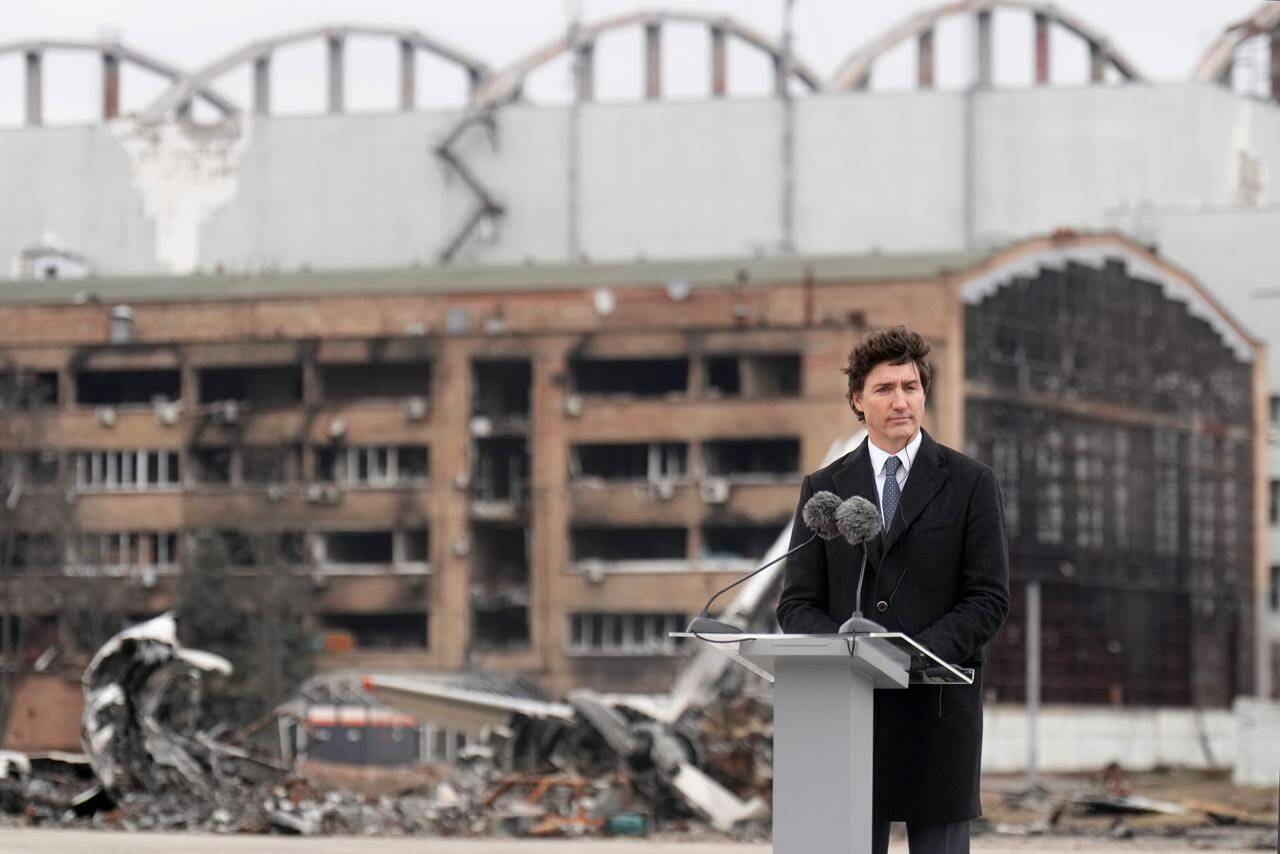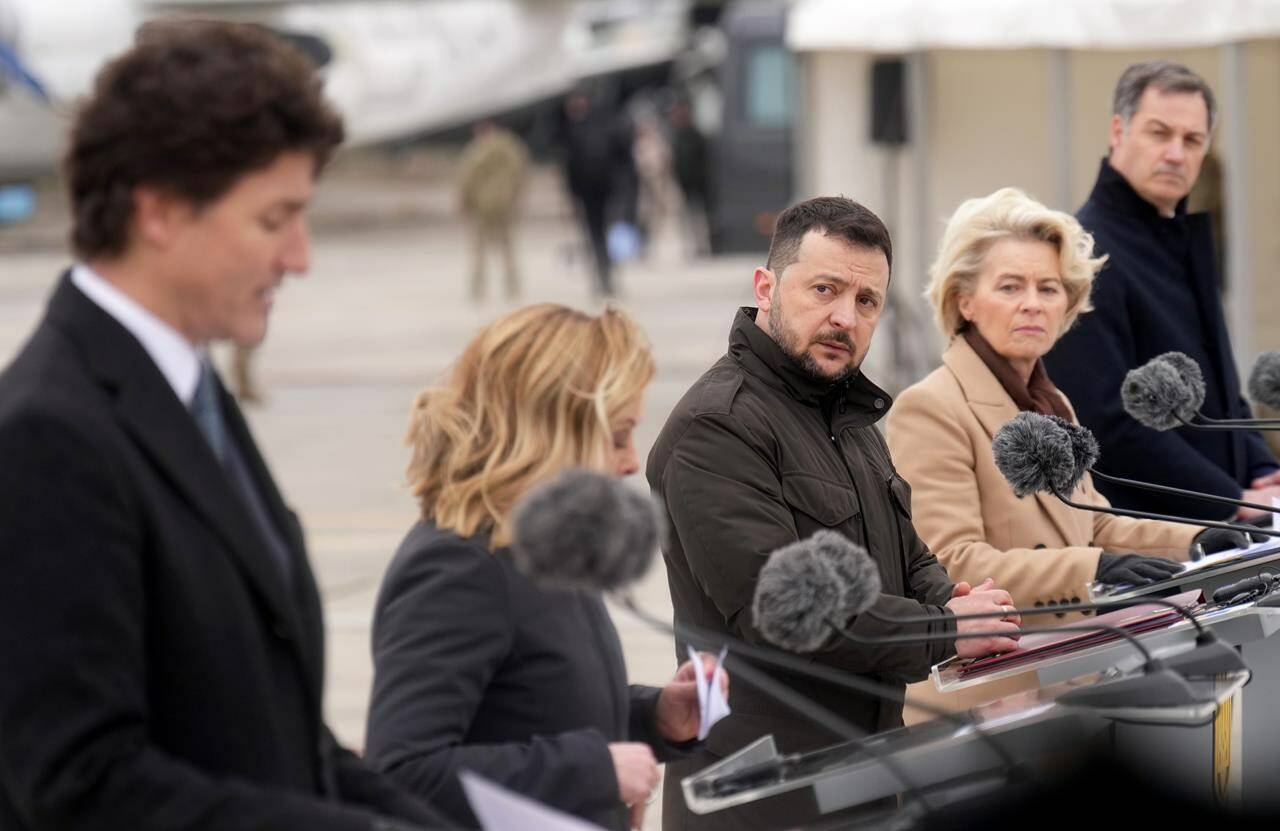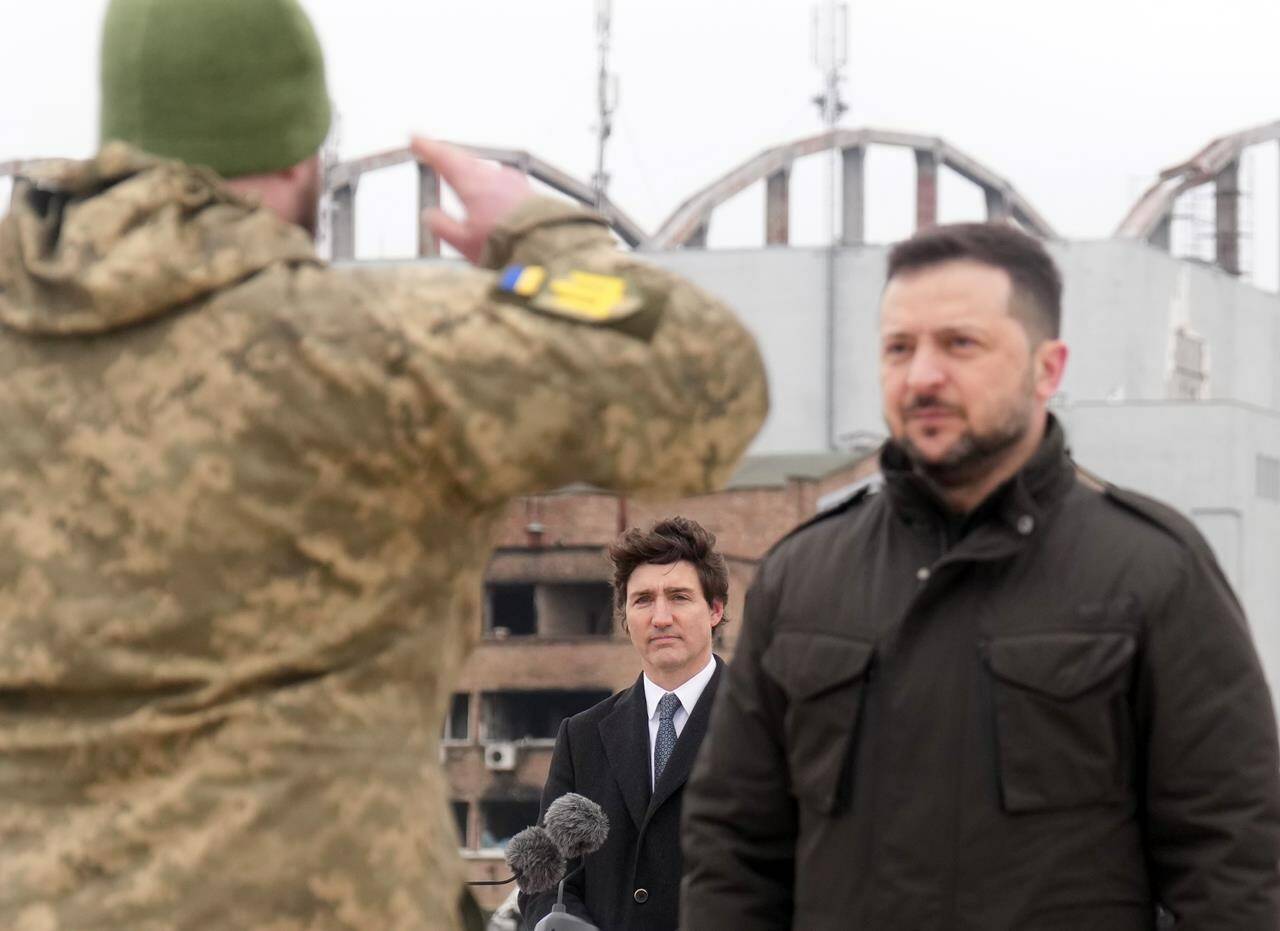Prime Minister Justin Trudeau surveyed the wreckage of one of the first battles in the brutal war that has gripped Ukraine for the last two years, as Ukrainians used Saturday’s anniversary of the fighting to take stock of a still uncertain future.
The prime minister joined other world leaders in a surprise visit to the Ukrainian capital Kyiv to sign a new security agreement with the embattled country, including a pledge for $320 million in new military spending by the end of the year.
The visit was part of a global campaign to showcase international solidarity with Ukraine in the face of a plodding, bloody conflict that experts say has no end in sight.
Trudeau appeared at Hostomel airport alongside European Commission President Ursula von der Leyen, Italian Premier Giorgia Meloni and Belgian Prime Minister Alexander De Croo. Behind them, the scorched husks of destroyed aircraft and the blackened walls of the airport served as a stark backdrop, a bitter reminder of the invasion’s earliest days.
“Putin was sure he could easily take strategic targets like this airport. Russian forces tried to make quick work of Hostomel airport — and with it, Kyiv,” Trudeau said. “Well, we are standing here today because he was wrong.”
The visit is Trudeau’s third to Ukraine since the war began.
Russian President Vladimir Putin launched his long-feared invasion on Feb. 24, 2022. His paratroopers raided the airport just hours after the start of what he called a “special military operation” in the country.
Two years later, the wreckage of that battle remained strewn behind the leaders as they took their turns speaking.
“Putin cannot win,” Trudeau said in his speech. “Ukraine will see victory, just like what happened on this ground two years ago.”
READ ALSO: 800 drones on way to Ukraine for surveillance, Canada says
Former British prime minister Boris Johnson was also on hand for the anniversary, as well as Canada’s Defence Minister Bill Blair and Deputy Prime Minister Chrystia Freeland. Absent were countries such as the United States, the United Kingdom, France and Poland, but they signalled their allegiance through public statements on social media.
Ukrainian President Volodymyr Zelenskyy gave a rousing speech in Ukrainian, praising the bravery and sacrifice of Ukrainian troops defending their country, and thanking his allies.
“Throughout all of this war you have been with us, with Ukrainians,” Zelesnkyy told the leaders at Hostomel. “It is extremely important to know that Ukraine can rely on such support as yours.”
That sentiment was felt in the heart of Kyiv Saturday as people wept while they looked for the faces of their loved ones on the walls around Mykhailivsky Golden-Domed Monastery. The walls are adorned with pictures of thousands of Ukrainian soldiers killed in hostilities with Russia dating back to 2014.
“I think it’s my personal, spiritual duty to remember, myself, every year, what happened with us, with our country, with my life,” said Andriy, who looked into the eyes of Ukraine’s fallen Saturday. He did not give his last name.
Many people left flowers in front of the tribute, including Trudeau, who laid a wreath before the wall of remembrance.
Andriy said the war has made him tougher, and more realistic about the hardships of life. He believes Ukraine will stand, but only with the help of the country’s allies, such as Canada.
“We will have enough inside motivation, we will have spiritual resources to win this war but we have not enough material resources,” he said.
The new security pact with Zelenskyy Saturday constitutes a long-term commitment to Ukraine’s security, Trudeau said at the end of his visit Saturday.
In addition to $320 million in new military spending, which is due by the end of the year, the deal calls for Canada to grant $2.4 billion in loans for Ukraine, to be administered through the International Monetary Fund. The loans will be used to repair bombed-out roads, pay essential workers, and allow the Ukrainian government to support its people who are living through war, Trudeau said.
Trudeau also announced $75 million to help finance the country’s demining efforts and intelligence gathering.
Despite similar sentiments from across the global coalition of support, European countries are struggling to find enough stocks to send to Kyiv, while $60-billion worth of U.S. help is stalled over political differences.
Trudeau has also attracted criticism for failing to deliver all the military aid Canada has promised.
The delays have frustrated Zelenskyy, who fears — like others — that such holdups amid domestic political squabbles are playing right into the hands of an ever-patient Putin.
“I’m grateful for every support package that helps our soldiers to fight, that helps our state to change and to become stronger,” Zelenskyy said.
“Putin must be defeated, must lose in everything, like it was in Hostomel.”
Just last week, Russia took complete control of the city of Avdiivka, about 706 kilometres east of the capital, where troops had battled fiercely over the local chemical plant for weeks. And a Russian drone attack late Friday struck a residential building in the southern city of Odesa, killing at least one person and injuring several others.
As he closed his visit while speaking with reporters, Trudeau launched a blistering attack on Putin, calling the Russian leader a “weakling” who uses police and the military to crush his opposition.
Trudeau accused Putin of “executing” opposition leader Alexei Navalny, who died unexpectedly a week ago in the Arctic penal colony where he was serving a 19-year sentence.
Navalny, 47, was roundly considered Putin’s greatest political foe. The Kremlin has rejected allegations that Putin was involved in Navalny’s death, calling them “absolutely unfounded, insolent accusations about the head of the Russian state.”
“I think we know, we’ve seen, repeatedly, the extent to which any opposition in Russia is either marginalized or, quite frankly, executed,” Trudeau said.
“What happened to Alexei Navalny demonstrates that for all that Putin pretends to be strong, he’s actually a coward.”
G7 leaders called on the Kremlin to clarify the circumstances around Navalny’s death Saturday and to stop the persecution of political opposition.
In the U.S., President Joe Biden has been cajoling and criticizing Republicans in Congress to help pass legislation to keep support to Ukraine flowing. Biden has chided his political opponents, including former and would-be future president Donald Trump, for inflamed rhetoric around Ukraine and a lack of support that borders on what the current commander-in-chief calls “criminal neglect.”
“Now is the time for us to stand strong with Ukraine and stand united with our allies and partners,” Biden said in a statement.
Trudeau has reached for similar reprovals when it comes to Canada’s Opposition Conservatives and their recent decision to vote against a modernized free-trade deal with Ukraine.
But in contrast to the U.S., both parties have tried to position themselves domestically as the more committed ally: Canada is home to the world’s second-largest Ukrainian diaspora population, after Russia.
“Ever since Prime Minister Harper confronted Putin after his illegal annexation of Crimea, Conservatives have been clear – Canada will always stand with Ukraine in defense of its freedom and sovereignty,” Conservative Leader Pierre Poilievre said in a statement Saturday.
In Kyiv, surrounded by photo’s of Ukraine’s fallen, a mother and daughter say their spirits remain unbroken.
“I feel the strength of the nation, we have not given up, we are holding on,” said the mother, Nadiya, in Ukrainian.
Echoing the call of western leaders Saturday, she called for unity.
“Ukraine will not be broken, Ukraine will survive, Ukraine will still be victorious,” she said.
“Ukraine is and will always be.”
READ ALSO: More than 220K Ukrainians in Canada ponder their future as war about to turn 2
READ ALSO: Vernon, Kelowna show support for Ukraine, 2 years after Russia’s invasion
— With files from Nathan Denette in Kyiv and The Associated Press
Roman Tymotsko in Kyiv and Laura Osman in Warsaw, The Canadian Press



